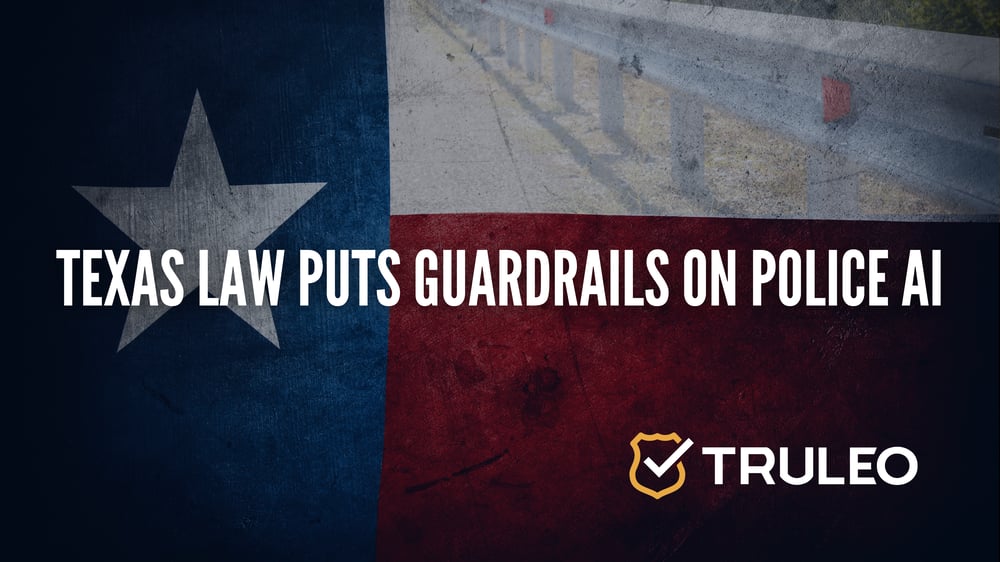Texas Puts Guardrails on Police AI: Why TRULEO’s Ahead of the Game
Technology Artificial Intelligence Zero Data Retention Privacy Jul 31, 2025 9:00:00 AM Anthony Tassone 5 min read

On June 22, 2025, Governor Greg Abbott signed the Texas Responsible Artificial Intelligence Governance Act (TRAIGA / HB 149) into law, marking one of the most comprehensive state-level AI laws in the country. This legislation—which takes effect January 1, 2026—sets clear legal guardrails around how artificial intelligence may be used, particularly when it comes to personally identifiable information (PII) and biometric data processed by third-party AI systems like OpenAI.
Law enforcement agencies across Texas should pay close attention. TRAIGA introduces real consequences for the unlawful sharing or misuse of sensitive data—and raises the stakes for departments currently using or exploring AI-powered tools in investigations, dispatch, and report writing.
More on the law: Texas House Bill 149 – Enrolled Version (TRAIGA)
Key Takeaways from TRAIGA for Law Enforcement
Why the Law Exists
TRAIGA was created to prevent sensitive personal data from being sent to non-secure platforms, especially consumer-grade AI tools that operate without proper legal safeguards. By restricting the transmission of personally identifiable information (PII) and biometric data to unsecured third-party AI systems, the law ensures that individuals’ rights are protected and departments maintain control over critical case data.
For law enforcement, that means:
❌ You must not:
- Share unredacted PII (names, addresses, facial images, case details, etc.) with third-party APIs like OpenAI’s public model.
- Use AI to predict or influence behavior in ways that could lead to profiling or discrimination.
- Delegate decisions like probable cause, arrests, or use of force exclusively to AI.
✅ You’re only compliant if:
- Your department has a formal AI data-sharing policy.
- No PII or biometric data is shared—or it is fully anonymized before use.
- The AI vendor (e.g., OpenAI) has a data processing agreement that complies with Texas law.
🚫 You’re non-compliant if:
- Officers send case details, facial data, or names directly into an AI chatbot or transcription tool with no oversight.
- There’s no impact assessment or internal approval process in place for AI tool adoption.
What This Means for Departments Using AI
Many agencies rely on third-party tools to help manage report writing, investigations, and operational data. But if those tools route sensitive information to external servers—or use public-facing APIs like ChatGPT without proper controls—your department could be in violation of TRAIGA starting January 1, 2026.
To stay compliant, departments must:
- Create internal AI use policies.
- Train officers on what constitutes PII and biometric data.
- Mask or anonymize inputs before sending data to any AI platform.
- Favor self-hosted or locally controlled AI systems.
- Conduct impact assessments on any AI used in investigative or operational workflows.
How TRULEO Supports TRAIGA Compliance
At TRULEO, we intentionally built our platform for law enforcement, and ONLY law enforcement, with privacy, control, and compliance at its core.
Here’s how we ensure agencies align with TRAIGA:
- No raw PII or biometric data is ever shared with OpenAI or third-party APIs.
We never transmit unredacted case information, faces, names, or identifying details to any public model. - All AI-powered features are CJIS-aligned and privacy-safe.
Our system is built with safeguards that ensure officer data stays in the agency’s hands, not a vendor’s data lake. - Local control and zero data retention.
TRULEO does not retain or reuse agency data. Our systems process information securely, then discard it. - Impact-aware, officer-driven workflows.
Our AI tools—including automated report writing, witness interviews, and case summarization—support officers without ever making independent decisions. Officers always remain in control of what is written, summarized, or submitted.
Learn more about our security and privacy on our website.
Trusted Across Texas
TRULEO is already in use by over 100 police departments across Texas, helping agencies streamline documentation and supervisor review workflows, reduce paperwork, and deliver officer-first automation that aligns with emerging legal frameworks like TRAIGA.
Texas has taken an important step toward responsible AI governance—and TRULEO is proud to be ahead of the curve.
We don’t just help you use AI—we help you use it responsibly.
Final Thought
As more states follow Texas’ lead, departments nationwide will face similar legal requirements. Don’t wait for a compliance crisis. Equip your agency with tools exclusively designed for law enforcement, not retrofitted from the private sector.
In the new era of AI law, compliance isn’t a feature—it’s a foundation, and we’re committed to building upon it!
👉 Start your free trial or contact us to learn how we can help your agency stay compliant with TRAIGA and beyond.

Anthony Tassone
Anthony comes from a proud military and law enforcement family, built communication intelligence platforms (COMINT), and serves as a board member of the FBI National Academy Associates (FBINAA) Foundation. He travels the country teaching trusted law enforcement leadership organizations, such as FBI LEEDS, about the practical use of artificial intelligence in policing. He received his bachelor’s degree in Computer Science from DePaul University and lives in Greenville South Carolina with his wife and four kids and is an avid bowhunter, rescue diver and triathlete.